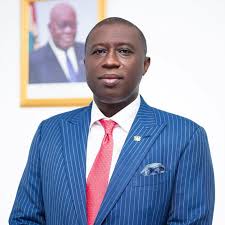The Minister for Education, Hon. Haruna Iddrisu, has provided a detailed mid-year performance review of the education sector, offering crucial updates on the implementation of President John Dramani Mahama’s education policies.
The Minister’s address underscored a sector actively undergoing significant reforms and receiving substantial investments, all aimed at bolstering Ghana’s human capital and ensuring equitable access to quality education.
A cornerstone of the government’s commitment to academic advancement and national development is the newly established National Research Fund.
Hon. Haruna Iddrisu proudly announced that this critical initiative has been officially set up, with a substantial seed funding of GHS 50 million already released by the Ghana Education Trust Fund (GETFund) to finance vital research endeavors.
This injection of capital into the research ecosystem is poised to invigorate Ghana’s academic institutions, fostering innovation and enabling scholars to delve into critical areas of study that can directly address national challenges and contribute to global knowledge.
The establishment of such a fund signals a strategic recognition of research as a vital engine for socio-economic progress, empowering local experts to find homegrown solutions to complex problems and elevating Ghana’s standing in the global scientific community.

Free SHS Feeding
Addressing a matter of significant concern for millions of Ghanaian families, the Minister provided an update on the feeding program in Senior High Schools (SHS).
He revealed that an impressive GHS 600 million has been disbursed to schools over the past six months, specifically for the feeding of students.
This considerable financial commitment underscores the government’s dedication to the welfare of students enrolled in the free SHS program, ensuring that nutritional needs are met, thereby supporting attendance, concentration, and overall academic performance.
The consistent and substantial disbursement of funds for feeding is crucial for the smooth operation of boarding facilities and alleviating financial burdens on parents, ultimately contributing to a more conducive learning environment for all students.
Localisation of Free Sanitary Pad Policy
In a bold move towards promoting local industry and enhancing the dignity of female students, Hon. Haruna Iddrisu disclosed a directive from President John Dramani Mahama regarding the Free Sanitary Pad policy.
“The President has unequivocally mandated that all sanitary pads under the Free Sanitary Pad policy be procured locally. No import whatsoever allowed,” the Minister remarked. This decisive policy shift is set to significantly boost domestic manufacturing capabilities, create jobs within Ghana, and reduce reliance on foreign imports.
Furthermore, the Minister revealed an intriguing proposal currently under review: the establishment of a Sanitary Pad manufacturing firm within Ghana’s Prisons.
This innovative idea, if implemented, could serve a dual purpose by providing meaningful employment and vocational training for inmates, contributing to their rehabilitation and reintegration into society, while simultaneously meeting a crucial national health and hygiene need.
It represents a forward-thinking approach to public-private partnerships and social enterprise, leveraging existing infrastructure for broader societal benefit.

GHS 7 million for Free Education for PWDs
The briefing also shed light on the government’s dedication to inclusive education and financial accessibility. Hon. Haruna Iddrisu announced that GHS 7 million has been specifically set aside to cover the fees of Persons With Disability (PWD) at the tertiary level.
This targeted funding aims to dismantle financial barriers that often impede academic pursuits for students with disabilities, fostering greater equity and ensuring that talent and potential are not curtailed by economic disadvantage.
Complimenting this initiative, the Minister highlighted the remarkable success of the “No-fees-stress” portal, which has already been accessed by 129,000 student applicants.
This portal, designed to streamline financial assistance and scholarship applications, underscores the significant demand for support and the government’s commitment to making tertiary education more accessible to a wider demographic of Ghanaian youth, thereby reducing the financial burden on students and their families.
Outcome from National Education Forum
Finally, Hon. Haruna Iddrisu shared insights into the extensive public engagement that has characterized recent educational policy development.
He disclosed that over 2,000 reform proposals were received from various stakeholders during the National Education Forum.
This overwhelming response signifies a vibrant and engaged citizenry, eager to contribute to the future of education in Ghana. The sheer volume of proposals, the Minister noted, reflects the diversity of perspectives and expertise within the educational ecosystem, from academics and practitioners to civil society organizations and parents.
This participatory approach to policy-making is crucial for developing robust, relevant, and widely accepted reforms that truly address the challenges and opportunities within the sector.

The government’s willingness to solicit and consider such a large number of inputs underscores a commitment to collaborative governance and a desire to build a consensus-driven framework for educational transformation.
In summary, Hon. Haruna Iddrisu’s mid-year briefing presented a compelling narrative of progress and proactive engagement within Ghana’s education sector under President John Dramani Mahama’s leadership.
From significant investments in research and student welfare to innovative approaches in local manufacturing and a strong emphasis on inclusivity and participatory policy development, the government is demonstrably committed to strengthening the foundations of Ghanaian education.
These initiatives collectively aim to enhance the quality of learning, expand access, and ensure that the educational system is responsive to the needs of all citizens, ultimately contributing to a more skilled, equitable, and prosperous Ghana.
READ ALSO: CUTS Calls on Bank of Ghana to Address Unfair ATM Charges



















